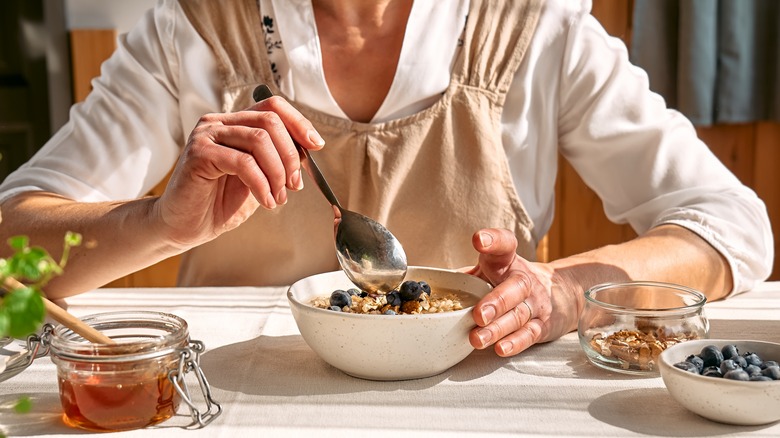The 3 Best Proteins You Can Eat To Lower High Cholesterol
Learning that your cholesterol is higher than you'd like can be frustrating. Yet elevated cholesterol is hardly a rare condition in adults. The U.S. Centers for Disease Control and Prevention estimates that approximately 86 million Americans over age 20 have at least moderately high cholesterol. This means that you're not alone.
Plus, you're not limited to relying on prescription medicines to keep your cholesterol at optimal levels. You have other options, like switching up your diet. The National Heart, Lung, and Blood Institute recommends its "TLC" or "Therapeutic Lifestyle Changes" diet for achieving healthier cholesterol numbers. The TLC diet concentrates on limiting saturated fats, upping fiber intake, and incorporating more plants into everyday eating to "treat and lower LDL cholesterol."
If you like the idea of using food to manage your cholesterol, start by incorporating chickpeas, walnuts, and oats into your meals and snacks. According to registered dietitian, intuitive eating counselor, and owner of Kara Lydon Nutrition and The Foodie Dietitian Blog Kara Lydon, this trio of superfoods is a good choice for anyone trying to tame high cholesterol. "Plant-based proteins provide other beneficial nutrients such as fiber, which can help lower cholesterol and support gut health," she told Health Digest in an interview.
The cholesterol-crushing ability of plant-based proteins
Science supports the idea of leveraging plant-based proteins to drop so-called "bad" cholesterol, or low-density lipoprotein (LDL), numbers.
For instance, WebMD says that chickpeas can lower both total and LDL cholesterol. In a 2006 controlled trial from the Annals of Nutrition and Metabolism, participants who ate a chickpea-supplemented diet for five weeks experienced lower LDL cholesterol than those who ate a diet supplemented by wheat. A 2014 meta-analysis published in the Canadian Medical Association Journal found that eating chickpeas and other legumes could "signficantly" lower LDL cholesterol.
A 2009 meta-analysis from The American Journal of Clinical Nutrition examined multiple studies during which participants attempted to lower their LDL cholesterol levels with walnuts. The researchers concluded that incorporating walnuts into the diet could reduce LDL cholesterol in the short term. Another 2021 study published in Circulation found that after eating a half-cup of walnuts for two years, healthy adults between ages 63 and 79 reduced their LDL cholesterol by an average of 4.3 milligrams per deciliter.
The online literature on oats' effect on LDL cholesterol also reveals positive findings. According to reporting from the Cleveland Clinic, adding 1.5 cups of cooked oats a day to your diet could reduce LDL cholesterol by 5%-8%. (And you could always double up by dressing your oatmeal with walnut pieces.)
In other words, you have research on your side if you're thinking of loading up on plant-based proteins to reduce your LDL cholesterol levels.
The nutritional make up of chickpeas, walnuts, and oats
The benefits of these three plants aren't limited to their cholesterol-improving superpowers.
Just how nutritionally impressive are chickpeas, walnuts, and oats? As Lydon noted, they're all nutrient-dense foods and plant-based proteins are reliable sources of vitamins and minerals such as iron, magnesium, B6, and B12.
For instance, MedicalNewsToday explains that a cup of chickpeas contains 4.7 milligrams of iron and the U.S. Department of Agriculture indicates that a one-cup serving of walnuts packs 3.4 milligrams of iron. Given that the National Institutes of Health recommends adults eat at least 8 mg of iron daily (18 milligrams for women between ages 19 and 50), you could get your daily dose of iron from a cup of each food.
As for oats, you get far more than meets the eye — or tempts the taste buds. Their fiber content is reason enough to eat them more regularly. Whole oats contain nearly 11% of soluble fiber, says Healthline. Plus, you have many oat types to choose from, including oats fortified with extra protein. Regardless of which type of oat you prefer, Lydon advises making room for them in your life, especially if you want to ward off cardiovascular problems exacerbated by elevated cholesterol. "Oats have long been shown to support heart health by lowering cholesterol due to the presence of the soluble fiber, beta-glucans, which bind to cholesterol and facilitate its secretion out of the body," she said.
Change your diet, improve your cholesterol numbers
Although adding chickpeas, walnuts, and oats to your weekly meals is a good first step toward controlling cholesterol, you can do more. For example, Lydon suggests increasing your soluble fiber intake with some of your favorite types of grains, nuts, and produce.
"Many people fall short of the recommended daily amount of fiber intake, which is 25 grams for women and 38 grams for men," explained Lydon. "To meet your daily fiber intake, add more soluble fiber-rich foods to your diet such as apples, beans, oats, barley, nuts, pears, and avocado." And if that's not enough, she has the answer: "If you're still falling short, consider adding a soluble fiber supplement to your day to make up the difference."
Next, increase your intake of monounsaturated fat to boost your "good" high-density lipoprotein (HDL) cholesterol through foods like olive oil and nuts. How much monounsaturated fat makes sense? MedlinePlus suggests that setting aside up to 10% of your dietary allotment of calories for monounsaturated fats to bring up your HDL cholesterol without causing a spike in your LDL cholesterol.
Though some individuals who struggle with too-high cholesterol require the assistance of pharmaceuticals like statins to manage their condition, you might be able to skip the pharmacy and take the all-natural route. Always talk with a doctor first, of course. If you get the go-ahead to try a holistic approach, find more tasty ways to add chickpeas, walnuts, and oats into your diet.
To learn more about Kara Lydon, visit Kara Lydon Nutrition and The Foodie Dietitian Blog.



